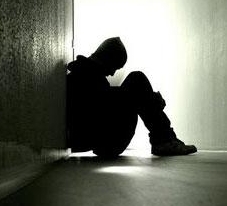Teen grief and loss counseling can help your adolescent through a major loss.
 Is Your Teen’s Grief or Loss Overwhelming?
Is Your Teen’s Grief or Loss Overwhelming?
- Has your teen suffered a significant loss?
- Is their pain and sorrow too much?
- Does it feel even your best efforts to comfort your teenager aren’t enough?
- Do you notice your teen withdrawing? Turning down social activities?
- Often angry?
- Is your teen experiencing disrupted sleep since their loss?
In this horrible time, teen grief and loss counseling might be helpful.
Teen grief and loss therapy can help with many emotions common to a major loss. For instance, your teenager might be experiencing confusion, hopelessness, lethargy, numbness, anger, frustration, a sense they are wandering aimlessly, and sometimes a total disconnection from a tragic loss as a psychological form of self-protection. In those cases, having a teen grief therapist can help contain those very difficult feelings.
Has Your Teen Lost a Close Family Member?
This is hard for a child to process. Life has always had that person in it. How does your teenager pick up the pieces and go on with this hole in their heart? Now everything feels off-kilter. Missing someone who was a key person in the family is extremely difficult to process for anyone.
Does Your Teenager Feel Guilty About Their Loss?
Guilt and grief go hand in hand. Adolescents cannot help but play the game, “If only I’d…” They frequently find ways to make the loss their fault. This complicates grief for a teenager. It makes it difficult to move towards a place of acceptance and reconciliation with the loss.
Does Your Teen Seem to be Eerily Fine with Everything?
Sometimes adolescents don’t seem to grieve at all. This leaves you feeling worried because they have gone through a major loss. Incidentally, grieving doesn’t look the same all the time. Perhaps your teenager is keeping a lot of pain inside, or maybe they will feel it at an unexpected moment. In all likelihood, your teen will eventually experience the pain of his or her loss.
What is grief?
Grief is the complex emotions that follow a serious loss. Loss is frequently the death of a loved one. However, it can also be the loss of something central to your teen’s sense of security and identity. While grief is a normal (yet painful) human experience, sometimes it turns into complicated grief. Unfortunately, this can last far longer than normal grief, and ultimately lead to Major Depressive Disorder.
 How Do Our Therapists Help with Teen Grief and Loss?
How Do Our Therapists Help with Teen Grief and Loss?
The therapists at Teen Therapy OC focus on the individual pain your teenager is going through. Perhaps you have heard of the 5 stages of grief, theorized by Elisabeth Kubler-Ross. Most people go through denial, anger, bargaining, depression, and then acceptance (not always in that order).
Accordingly, your teen’s therapist helps determine where you teen is in the grieving process. Additionally, the counselor provides a safe, warm space to navigate each step of grief.
We also want to see your son or daughter begin to understand the various ways their loss has impacted them. We help them prepare for the ways their grief may reemerge in different life stages. Most importantly, we give your teenager room to cope with the incredibly difficult and complex emotions stemming from grief and loss.
Common Questions About Grief and Loss Therapy for Teens:
I AM GRIEVING TOO. HOW DO I SUPPORT MY TEENAGER?
Grief counseling is interesting in that teens often don’t want to keep this process as private as other types of therapy. They may wish to include you in some of the sessions. You, your teen, and your therapist will spend some time discussing how to process this loss at home with your teen.
HOW LONG DOES GRIEF COUNSELING TAKE?
A typical amount of time is 3 months. That is a rough estimate because everyone is different. Some teenagers like to eventually space therapy out, but they want to continue counseling sessions here and there. This is because the rest of the world has moved on from the loss, but your teen still wants a space to process living life without who/what they once had.
IS GRIEF COUNSELING FOR TEENS ONLY WHEN THERE IS A DEATH?
No. Grief and loss occur when someone (or sometimes something) very important to your teen leaves their life. Consequently, many teens experience profound grief after a break-up or when their parents divorce. Other teens grieve when they graduate high school and can no longer play their sport. Loss is extremely personal, which means nobody can judge your teen for what has caused them to feel grieved.
There is Hope for Loss Integration and Life After Loss:
People don’t “get over” losing someone who matters to them. Instead, people learn to “live with the ghost.” Your teenager will never be the same after what has happened. Eventually, your teen will stop thinking of the end, instead, remembering the sweet times. Many teens we’ve seen at TTOC who have lost a parent say they can still recall the end with effort, but when they think about their mom or dad, they think of the days when things were good. They find a way to continue connecting with their lost loved one while life marches on. Because of this, we have every hope your teenager will integrate their loss too.
Therapists Specializing in Teen Grief and Loss Counseling
Jazmine Albarian experienced the gut-wrenching loss of her mother to cancer while she was in her twenties. For that reason, Jazmine cares deeply about the pain teenagers feel when they are losing a family member or close friend. Consequently, she has a passion for adolescent grief and loss therapy, and she is always willing to talk to you about your teen’s situation.
Diana Hong has a tender, gentle approach with every client. In effect, she is able to meet any teenager right where they are. As a result, Diana moves them forward without ever rushing them. She has sat with teens who experienced tremendous loss ranging from the loss of family structure through divorce, to the loss of friends and family members through death, addiction, and even something simpler like a geographical move.
Carrie Johnson provides therapy for trauma recovery through various therapeutic methods including EMDR. She believes strongly in helping clients at their own pace. For example, she mixes humor into the counseling when she senses her clients need a little space to rest from intensely painful emotions. Then, when they are ready again, Carrie and her clients resume exploring the thoughts, feelings, and meaning in their loss. Carrie typically works with our young adult clients (ages 18+).


